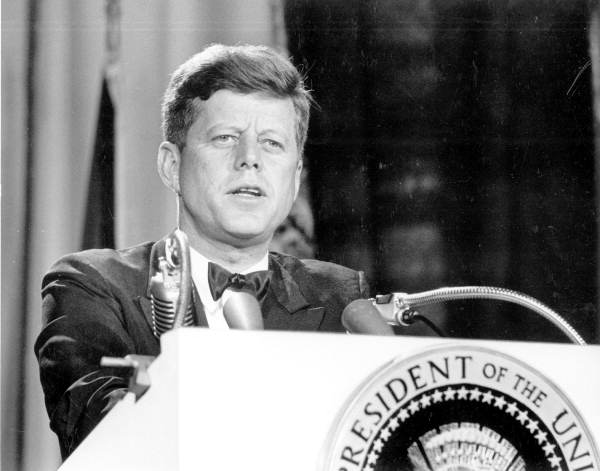In 1961, newly inaugurated President John Fitzgerald Kennedy delivered what would later be acknowledged as one of the greatest presidential speeches in US history. The scene was historic — on stage with JFK were past presidents Harry S. Truman and Dwight D. Eisenhower and future presidents Lyndon B. Johnson and Richard M. Nixon, 29 years of American presidential history. A poem was recited by Robert Frost and the president was sworn in by Chief Justice Earl Warren, later of the controversial Warren Commission. The United States of America was reaching the zenith of an increasing confidence in its global mission to support freedom and democracy around the world in opposition to what were seen as inhumane Communist dictatorships: a confidence later eroded by the scandal of Watergate and the quagmire that became the Vietnam War.
This dignified scene was truly moving; except… something was missing: President Kennedy’s hat.
Like most societal codes, presidential dress on inauguration day operated according to unofficial and even unnamed rules. A president was to wear “morning dress”, a kind of formal suit with a vest and frock coat with tails; and of course, a top hat.
President Kennedy’s choice not to wear a hat has often been credited with the downfall of the men’s hat industry. Up until that time, so the story goes, most men wore hats on a daily basis. Kennedy (and the Beatles) did not. His televised publicity along with his widespread popularity reinforced the idea that one didn’t need to wear a hat. After all, the president doesn’t.
***
While the demise of the hat in public life might have been an unintended effect of the 1960 election, one wonders what will be the unintended effects in the 2016 election?
Both candidates, though perhaps one more than the other, have sunk (this must be the correct verb) to previously unseen standards when addressing each other during the three presidential debates. At the recent Al Smith dinner; a dinner hosted by the Archdiocese of New York to raise money for poor children and a dinner traditionally “off limits” to serious political invective, both candidates weighed in on each other in a manner which has been described as both awkward and undignified.
The amount of media attention given to this less than dignified repartee of the current election cycle has been diffuse. But it has likewise revealed an unquestioned public assumption: That Presidents ought to be dignified; they ought to be Ladies and Gentleman.
There is something natural about this prejudice. After all, the Presidency of the United States is the highest public office in the land and therefore ought to be accorded a certain amount of respect and dignity, which in turn must be embodied by its holder.
“Presidential dignity”, however, is not enshrined in law. There are no official standards of debate below which a presidential candidate is not permitted to sink. There are no federal or state laws which regulate the etiquette of presidential candidates anymore than those which regulate our manners at a dinner party.
These invisible laws are culturally conditioned and intensely societal. Once broken, however, they are often revealed to be more fragile than we might have expected.
It would be a stretch to suggest that past election cycles were free from mud slinging, but it was usually undertaken deftly and often obliquely, as when automated calls were used in the 2000 Republican primaries to imply, though never actually claim, that Sen. John McCain fathered an illegitimate child. Or when the 1964 Johnson campaign reworded Republican campaign stickers to suggest that Sen. Goldwater might instigate a nuclear war.1
And so I wonder about the current level of discourse among our presidential candidates. Will this become commonplace? Have we, as citizens, become inured to behavior which a decade earlier would have gone beyond the pale? Or might this degradation of public discourse reflect our growing preference as a society generally?
Will future presidential candidates seem restrained and prudish if they fail to live up to the current level of political ad hominem?
***
The cost of this election to the general public may be the beginning of the end of a previously unquestioned ideal: presidential dignity.
In the past the American public seems to have made a distinction between the person and the office. If a president failed to live up to that dignity, then the implication that such a dignity exists served to reinforce the ideal.
But when an ideal ceases to be politically useful it is promptly abandoned, and it seems increasingly clear that this election cycle has rendered past ideals of presidential dignity obsolete.
Whoever is elected on November 8 will be expected to address the nation as our president. I expect our new president to be humbled by the grave responsibility and dignity of that office. I do not expect, however, that our new president will be wearing a hat.
***
Image courtesy of FlickrCC user Florida Memory.
- Sen. Barry Goldwater’s campaign slogan was “In your heart, you know he’s right.” The Johnson campaign released bumper stickers which read: “In your heart, you know he might.” (implying a nuclear war with the Soviet Union). ↩


